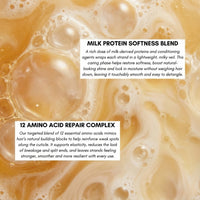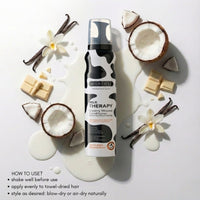Dealing with Dandruff: Effective Solutions and Remedies
Posted by MORFOSE COSMETICS

Battling the Flakes: Dealing with Dandruff Effectively
Dandruff – those pesky white or yellowish flakes that find their way onto your clothes and create discomfort and embarrassment. If you're one of the many people who struggle with dandruff, rest assured that you're not alone, and there are effective solutions to help you combat this common scalp condition. In this comprehensive guide, we'll explore the world of dandruff, from understanding its root causes to discovering proven home remedies and solutions that will help you say goodbye to flakes for good.
The Root of the Issue: Understanding the Causes of Dandruff
Before we dive into the solutions, let's first uncover the underlying causes of dandruff:
- Malassezia: Dandruff is often linked to a microbe called Malassezia that naturally resides on the scalp. For some individuals, Malassezia can overgrow, leading to dandruff.
- Dry Skin: Dry, flaky skin on the scalp can be a consequence of low humidity or inadequate skin moisture. When these flakes mix with oils from the scalp, they form dandruff.
- Seborrheic Dermatitis: This is a more severe form of dandruff characterized by red, greasy skin with flaky white or yellow scales. It's often accompanied by itching and can affect areas beyond the scalp.
- Contact Dermatitis: Allergic reactions to hair care products or certain ingredients can lead to dandruff-like symptoms.
- Not Shampooing Enough: Not shampooing regularly allows oils and skin cells to build up on the scalp, creating a favorable environment for dandruff.
- Diet and Health: An unbalanced diet, stress, and certain medical conditions can influence dandruff.
Home Remedies and Proven Solutions: Say Goodbye to Dandruff
Now that we understand the root causes, let's explore effective ways to bid farewell to dandruff:
- Choose the Right Shampoo: Opt for anti-dandruff shampoos that contain active ingredients like ketoconazole, pyrithione zinc, coal tar, salicylic acid, or selenium sulfide. These ingredients help combat the microbes and excessive skin cell production that contribute to dandruff.
- Regular Shampooing: Wash your hair regularly to keep your scalp clean. While there's no universal rule for how often to shampoo, a few times a week should suffice. Be mindful of over-shampooing, as it can strip your scalp of natural oils.
- Adjust Your Diet: A balanced diet that includes essential nutrients like zinc and B vitamins can promote a healthy scalp and reduce the risk of dandruff. Foods rich in these nutrients include whole grains, lean meats, nuts, and vegetables.
- Manage Stress: Chronic stress can worsen dandruff symptoms. Practice stress-reduction techniques such as meditation, yoga, or deep breathing exercises to help alleviate this condition.
- Natural Remedies: Some home remedies like aloe vera gel, tea tree oil, apple cider vinegar, or coconut oil can help alleviate dandruff. These natural treatments can be used in addition to or in place of commercial shampoos.
- Keep Your Hair Care Products in Check: Be mindful of the hair care products you use. Avoid products that contain allergenic or irritating ingredients. Always perform a patch test when trying new products.
- Avoid Excessive Heat: Extremely hot water can strip your scalp of its natural oils. Use lukewarm water when washing your hair.
- Consult a Professional: If your dandruff is persistent or severe, it's advisable to seek advice from a dermatologist or healthcare professional. They can provide more advanced treatments and recommendations.
Dandruff can be a frustrating issue, but it's one that can be effectively managed with the right approach. By understanding its causes and following proven solutions and home remedies, you can say goodbye to flakes and regain a healthy, flake-free scalp. Don't let dandruff hold you back; embrace a life with confidence and a clear, dandruff-free scalp.
 Battling the Flakes: Dealing with Dandruff Effectively
Battling the Flakes: Dealing with Dandruff Effectively
Dandruff is a common scalp condition that affects people of all ages. Those pesky white or yellowish flakes not only find their way onto your clothes but can also create discomfort and embarrassment. If you're one of the many individuals who struggle with dandruff, you're not alone. The good news is there are effective solutions to help you combat this issue and achieve a healthier, flake-free scalp. In this comprehensive guide, we'll explore the world of dandruff, from understanding its root causes to discovering proven home remedies and solutions that will help you say goodbye to flakes for good.
The Root of the Issue: Understanding the Causes of Dandruff
Before we delve into the solutions, it's essential to uncover the underlying causes of dandruff, as this understanding can guide us in effectively addressing the issue.
- Malassezia: Dandruff is often linked to a microbe called Malassezia that naturally resides on the scalp. For some individuals, Malassezia can overgrow, leading to dandruff. This overgrowth triggers an inflammatory response in the scalp, causing skin cells to shed more rapidly, leading to those visible flakes.
- Dry Skin: Dry, flaky skin on the scalp can be a consequence of low humidity or inadequate skin moisture. When these flakes mix with oils from the scalp, they form dandruff. This is a common issue, particularly during the winter months when the air tends to be drier.
- Seborrheic Dermatitis: This is a more severe form of dandruff characterized by red, greasy skin with flaky white or yellow scales. It's often accompanied by itching and can affect areas beyond the scalp, such as the eyebrows, ears, or chest. While the exact cause is unknown, factors like yeast, genetics, and hormones can contribute to seborrheic dermatitis.
- Contact Dermatitis: Sometimes, dandruff-like symptoms can result from allergic reactions to hair care products or certain ingredients found in shampoos, conditioners, or styling products. If you suspect this might be the case, it's important to review the ingredients in your hair care products.
- Not Shampooing Enough: Infrequent shampooing allows oils and dead skin cells to accumulate on the scalp. This creates an environment where Malassezia can thrive and contribute to dandruff. On the other hand, excessive shampooing can strip the scalp of its natural oils, causing dryness and potential flaking.
- Diet and Health: Your overall health, including your diet and stress levels, can influence dandruff. A balanced diet that includes essential nutrients like zinc and B vitamins can promote a healthy scalp and reduce the risk of dandruff. Foods rich in these nutrients include whole grains, lean meats, nuts, and vegetables. Chronic stress can worsen dandruff symptoms, so managing stress through techniques such as meditation, yoga, or deep breathing exercises is vital.
Home Remedies and Proven Solutions: Say Goodbye to Dandruff
Now that we understand the root causes of dandruff, let's explore effective ways to bid farewell to those unwanted flakes and regain a healthy, flake-free scalp:
- Choose the Right Shampoo: Opt for anti-dandruff shampoos that contain active ingredients like ketoconazole, pyrithione zinc, coal tar, salicylic acid, or selenium sulfide. These ingredients help combat the microbes and excessive skin cell production that contribute to dandruff. When selecting an anti-dandruff shampoo, ensure it aligns with your hair type and specific needs.
- Regular Shampooing: Wash your hair regularly to keep your scalp clean. While there's no universal rule for how often to shampoo, a few times a week should suffice for most people. Be mindful of over-shampooing, as it can strip your scalp of its natural oils, leading to dryness and potential flaking.
- Adjust Your Diet: A balanced diet that includes essential nutrients like zinc, B vitamins, and healthy fats can promote a healthy scalp and reduce the risk of dandruff. Foods rich in these nutrients include whole grains, lean meats, nuts, and vegetables.
- Manage Stress: Chronic stress can worsen dandruff symptoms. Practice stress-reduction techniques such as meditation, yoga, or deep breathing exercises to help alleviate this condition. Not only will your scalp thank you, but your overall well-being will also benefit.
- Natural Remedies: Some home remedies like aloe vera gel, tea tree oil, apple cider vinegar, or coconut oil can help alleviate dandruff. These natural treatments can be used in addition to or in place of commercial shampoos. Keep in mind that individual responses to these remedies may vary, so experiment to find the one that works best for you.
- Keep Your Hair Care Products in Check: Be mindful of the hair care products you use. Avoid products that contain allergenic or irritating ingredients. Perform a patch test when trying new products to ensure they don't exacerbate your dandruff.
- Avoid Excessive Heat: Extremely hot water can strip your scalp of its natural oils, contributing to dryness and flaking. Use lukewarm water when washing your hair, especially during the winter months.
- Consult a Professional: If your dandruff is persistent, severe, or accompanied by symptoms such as redness, swelling, or open sores, it's advisable to seek advice from a dermatologist or healthcare professional. They can provide more advanced treatments and recommendations, such as prescription-strength medicated shampoos or topical treatments.
Dandruff can be a frustrating issue, but it's one that can be effectively managed with the right approach. By understanding its causes and following proven solutions and home remedies, you can say goodbye to flakes and regain a healthy, flake-free scalp. Don't let dandruff hold you back; embrace a life with confidence and a clear, dandruff-free scalp.



